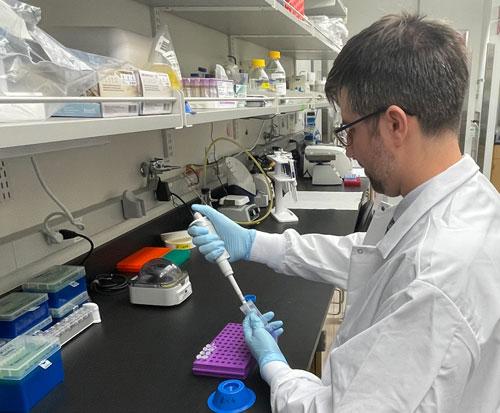
Fortenbach Lab
Degenerative blinding diseases, such as age-related macular degeneration, are responsible for more than 200 million cases of vision loss worldwide. Among the diseases resulting in retinal degeneration, many cause gradual dysfunction and ultimately death of the light-sensing cells in the retina known as photoreceptors. While treatments to prevent degeneration remain under investigation, therapies to restore vision have begun to emerge. These include, but are not limited to, gene therapy, stem cell therapy, optogenetic approaches, and synthetic small molecules known as photoswitches.
Dr. Fortenbach’s lab is investigating the therapeutic potential for photoswitches to restore vision in degenerated retinas. These light-sensitive small molecules bind to the degenerating retina and confer new light-sensitivity to retinal cells. Several generations of these molecules have been developing with differing cell target specificity and sensitivity. Photoswitches can be delivered via intravitreal injection, which is a procedure performed over 20 million times per year globally, rather than requiring retinal surgery. Most recently, promising phase 1 clinical trial data have been presented demonstrating restoration of vision in several human subjects.
The Fortenbach Lab is researching the mechanisms by which photoswitches restore light-sensitivity and methods to improve visual outcomes among treated individuals. The lab uses a combination of electrophysiology methods including whole-cell and multielectrode array recordings in conjunction with machine learning to assess the ability of photoswitches to encode visual information. Overall, the goal of the lab is to help develop a medication capable of restoring sight and improving the quality of life for patients with vision loss.
